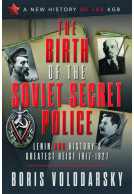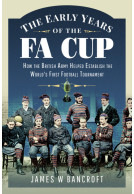Assassins (Hardback)
The KGB's Poison Factory Ten Years On
Publicity
As seen in GQ magazine: How a hit on a retired spy named Sergei Skripal became the latest – and most terrifying – front in Vladimir Putin's war with the West; Russian-intelligence historian and former GRU man Boris Volodarsky joins GQ magazine to discuss the poisoning of a Russian double agent.
As seen in The Times: The Skripals, the Kremlin threat and the Russian security expert who thinks he knows why they were poisoned. Andrew Billen meets Boris Volodarsky.
The dark arts of the Russian poisoners: Were Sergei Skripal and his daughter poisoned by Putin's operatives? The former Russian special forces officer Boris Volodarsky assesses the evidence, via The Times.
(click here for international delivery rates)
Order within the next 1 hour, 2 minutes to get your order processed the next working day!
Need a currency converter? Check XE.com for live rates
| Other formats available - Buy the Hardback and get the eBook for free! | Price |
|---|---|
| Assassins ePub (13.5 MB) Add to Basket | £6.99 |
7 December 2006 was a lousy day. Only hours before the event a secret message was delivered to a narrow circle of people who were invited to attend the burial ceremony of Alexander ‘Sasha’ Litvinenko at Highgate Cemetery. Oleg Gordievsky, his companion Maureen and myself arrived in London from our homes in Surrey and took the underground that brought us most of the way to our destination. In the nearest pub Oleg ordered three double gin-and-tonics and a cab that arrived promptly. The weather was bad but not yet rainy – a storm would begin later.
It took two weeks before the authorities gave the clearance for Sasha’s funeral. His body presented a major environmental hazard, they declared, and every place where he had spent the last three weeks of his life were decontaminated while his body, after the post-mortem, was removed to some secret facility. Should the family wish to cremate him, it was said, they would have to wait for twenty-eight years until the radioactivity decays to safe levels.
Oleg, Maureen and I got out of the cab at the gate that had already been surrounded by hundreds of television cameras and photographers. We were greeted by a solemn and rather small party of about fifty mourners gathered under an overcast London sky. Marina Litvinenko, Sasha’s widow, and their son Anatoly were together with Boris Berezovsky, Akhmed Zakayev, Alex Goldfarb and Andrei Nekrasov. Vladimir Bukovsky with several foreign guests who knew Sasha stood slightly aside. At that sad moment, none of us could predict what was going to happen in ten years but we well understood that starting from that day our lives would be different.
In barely audible Russian Sasha’s father, Walter, told mourners gathered around the muddy grave: ‘My son was killed for telling the truth by those who are afraid of what he had to say.’ And I thought, ‘All right, I am going to investigate who did it and find out why and how’. It took me ten years to do it.
It is fascinating, packed with information, deeply and widely researched and written with passionate engagement. It is also important, showing not only what happened in the past but what is happening now, lessons for the future which we are too often reluctant to learn. I am sure future writers on this subject will quarry it for information.
Alan Judd
The author, a former GRU officer and now an historian, updates the assassins story during the last decade. The use of computer hacking, disinformation, propaganda and murder by Putin’s Russia pose every bit as much threat to his neighbours as did the Soviet Union. – Most Highly Recommended
Firetrench
Read the full review here
Some will remember the stir created in 2009 by the publication of Boris Volodarsky's sensational book The KGB's Poison Factory: from Lenin to Litvinenko. Since then, the Factory has continued to function and the poisoning in the spring of 2019 in Salisbury of Sergei Skripal and his daughter Yulia saw the British media revive its interest in the phenomenon and, as so often, turn to Boris Volodarsky to explain what was going on.
Professor Sir Pail Preston
Inveterate researcher Boris has now published a new catalogue of the horrors emanating from "the Factory," Assassins: The KGB's Poison Factory 10 Years On. Like all of Boris's books, this one is astonishing for the scale of inside knowledge and geographical span rendered un-put-downable by a lucid style and lots of witty asides.
With recent high profile cases of KGB poisonings of western diplomats and refugees on British soil, this book is long overdue and a fascinating account of what goes on in Russia to this day. Incredible.
Books Monthly
Like all of Boris's books, Assassins is astonishing for the scale of inside knowledge and geographical span rendered un-put-downable by a lucid style and lots of witty asides.
World Association of International Studies
As featured in
The Times 7/3/18
About Boris Volodarsky
Boris Volodarsky is one of the very few people uniquely qualified to write this book. Boris began investigating the poisoning of Alexander “Sasha” Litvinenko even before the victim passed away in the University College London Hospital. His famous article, “Russian Venom”, was published by The Wall Street Journal on 22 November 2006 correctly describing the then unknown substance that would kill Sasha hours later as a radioactive poison before anyone, even experts from the UK Atomic Weapons Establishment were able to identify it as Polonium-210. Invited to take part in the investigation, Boris collaborated with SO15 and served as a main consultant to the BBC Panorama documentary “How to Poison a Spy” (BBC One, Monday, 22 Jan 2007 at 20:30).
A former military intelligence officer who defended his doctoral thesis in intelligence history at the London School of Economics and Political Science, Dr Volodarsky is a Fellow of the Royal Historical Society and author of several important non-fiction books published in Britain and the USA, including Stalin’s Agent (Oxford University Press, 2014) and his most recent new history KGB: The West Side Story to be published this year by Pen & Sword. Boris currently works an independent intelligence analyst in London and Washington.


















